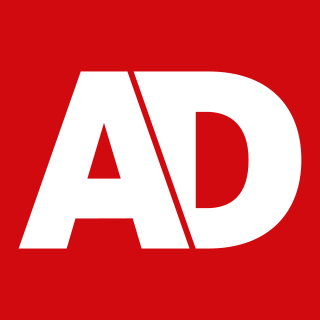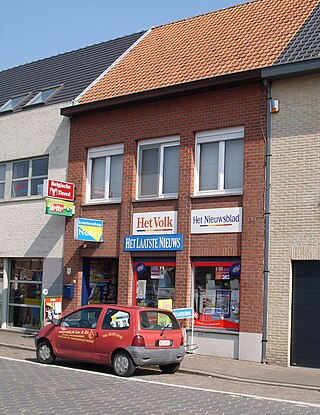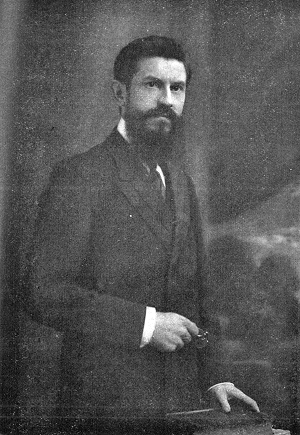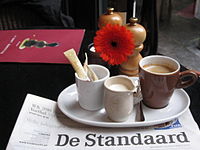
The Algemeen Dagblad, also known by its initialism AD is a Dutch daily newspaper based in Rotterdam.

De Morgen is a Flemish newspaper with a circulation of 53,860. The paper is published in Antwerp, Belgium.

The Adventures of Nero or Nero was a Belgian comic strip drawn by Marc Sleen and the name of its main character. The original title ranged from De Avonturen van Detectief Van Zwam in 1947 to De Avonturen van Nero en zijn Hoed in 1950, and finally De Avonturen van Nero & Co from 1951. It ran in continuous syndication until 2002. From 1947 until 1993 it was all drawn by Sleen himself. From 1992 until 2002 Dirk Stallaert took over the drawing while Sleen kept inventing the stories.

Le Soir is a French-language quality Belgian daily newspaper. Founded in 1887 by Emile Rossel, it was intended as a politically independent source of news. Together with La Libre Belgique, it is one of the country's most popular Francophone newspapers in both Brussels and Wallonia, and since 2005 has been published in Berliner format. It is owned by Rossel & Cie, which also owns several Belgian news outlets, as well as the French paper La Voix du Nord.

Het Laatste Nieuws is a Dutch-language newspaper based in Antwerp, Belgium. It was founded by Julius Hoste Sr. on 7 June 1888. It is now part of DPG Media, and is the most popular newspaper in Flanders and Belgium.

Het Nieuwsblad is a Flemish newspaper that mainly focusses on "a broad view" regarding politics, culture, economics, lifestyle, society and sports.
The Gazet van Antwerpen is a Belgian newspaper in Antwerp and Flanders, published by Concentra.

La Libre Belgique, currently sold under the name La Libre, is a French-language quality Belgian daily newspaper. Together with Le Soir, it is one of the country's most popular Francophone newspapers in both Brussels and Wallonia. La Libre was founded in 1884 and has historically had a centre-right Christian Democratic political stance. The papers is particularly celebrated for its role as an underground newspaper during World War I and World War II when Belgium was occupied. Since 1999, the newspaper has become increasingly liberal but is still considered more conservative than Le Soir.

Dyab Abou Jahjah is an Arab political activist and writer who was active in Europe between 2001 and 2007. He is the founder and former leader of the Arab European League (AEL), a Pan-Arabist movement that supports the interests of Muslim immigrants in Europe.

Het Volk was a Belgian newspaper that focused on "news with a human undertone".
Mediahuis is a European multinational newspaper and magazine publishing, distribution, printing, television, radio and online media company founded in 2014 with assets in Belgium, the Netherlands, Ireland, Luxembourg and Germany. Mediahuis publishes daily newspaper titles in Belgium, the Netherlands and Ireland as well as regional titles, and is involved in broadcasting a number of Dutch and French language TV and radio stations.

Frans Van Cauwelaert, was a Belgian Roman Catholic politician and lawyer.
Metro was a free newspaper in Belgium, distributed on working days and aiming in particular at 18- to 44-year-old urban, active, mobile students and commuters. Separate Dutch and French-language versions, each with its own content, were according to the area's language(s) available in railway stations, subway stations, universities, etc. from dedicated stands that had the colour of the paper's header: blue for Dutch and green for French for easy recognition, especially where both occur.

Scouts en Gidsen Vlaanderen is a coeducational, Flemish Scout and Guide organisation in Belgium and is a member of the Guidisme et Scoutisme en Belgique/Gidsen- en Scoutsbeweging in België.
Piet Paul August, Baron Van Waeyenberge is a Belgian businessman. He is a son of Camille Van Waeyenberge and a brother of Jozef Van Waeyenberge. He was one of the founders, and is currently president, of business club De Warande. He is married to Wina Proesmans and together they have 3 children.
Lodewijk Petrus Alfons, Baron Campo was a Belgian business executive.
The mass media in Belgium is characterized by its diversity due to the linguistic divide in the country.
Le Vif/L'Express is a weekly news magazine published in Brussels, Belgium. It has been in circulation since 1963.
L'Avenir, formerly Vers l'Avenir, is a Belgian newspaper franchise based in Namur. It is one of the largest media groups in Belgium. The group publishes nine regional newspapers in French, grouped since June 2010 under the brand name L'Avenir.
't Kapoentje was a youth supplement published by the Flemish newspaper Het Volk from April 3, 1947 until 1989. It was notable for its comics and, together with Ons Volkske, the most important comic book magazine in Flanders.











